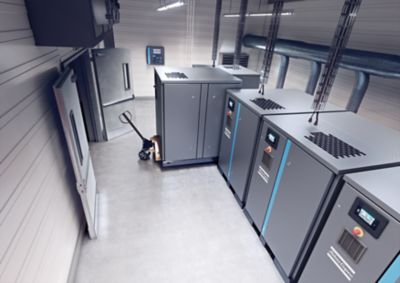Where to use compressed air ?
- Instrument air: Compressed air for robots and pneumatic tools for assembling cars.
- Pick and place: Compressed air to generate vacuum without a need for decentralized equipment at your productionline.
- Car spray painting: Compressed air for multiple layers of car paint. Silicone-free air for water-borne car paint.
What are the main benefits for using compressed air for your automotive application?
- Silicone free solutions for automated car paint lines: Highest quality standards apply for compressed air used in spray paint applications. We develop solutions with all major players in the industry to avoid paint defects and optimize efficiency.
- Lower cost for high quality instrument air: We can deliver compressors with matching air treatment solutions, we can reduce your operating cost. Our air treatment equipment is designed specifically to operate in most efficiently with our compressors, optimally using their waste heat and avoiding air losses for regeneration.
- Carbon neutral operations: Use excess heat from your compressor installations with our Energy Recovery solution.
↓ Watch how we contribute to the automotive industry ↓
Hyundai optimizes energy efficiency in compressed air generation
How we improved the energy efficiency in compressed air generation, reduced 40 to 50% in maintenance costs, reached 0 breakdowns and reached a 100% reliability for the production of over 200.000 vehicles a year.
Paintspray application movie DuPont Belgium
Watercooled AQ compressor with an integrated refrigerant dryer
Saving energy for energy supplier Matrival
Matrival is one of the first companies to install the new Atlas Copco GA VSD+ compressor. A truly revolutionary machine, with an innovative vertical build and a very reliable permanent magnet motor. This compressor has a small footprint and guarantees energy efficiency.
Saving energy for automotive compressed air
We offer them the best possible energy savings. Learn how we were able to save our automotive customer around € 3 million per year.
Our solutions for the automotive industry
Assembly
Compressed air is used for robots and pneumatic tools for assembling cars.
Pneumatic conveying
Compressed air used for transport of raw materials/plastic, fabrication, moldings.
Pick and place
Compressed air is used to generate a vacuum without a need for decentralized equipment at your production line.
Car spray painting
Compressed air for multiple layers of car paint. Silicone-free air for water-borne car paint.
Laminating and testing of windshields
Compressed air is used to cut, transport, laminate and test the windshields for car manufacturers.
Wastewater Treatment
Compressed air is used to
Compressed air is used to
Compressed air is used to
Compressed air is used to treat wastewater that is used during the production process in the automotive industry.
Why use Nitrogen in paint spraying ?
- Reduces your overall paint consumption: Using heated nitrogen to improve finish quality, apply fewer coats of paint and reduce transfer and bake time.
- Eliminates orange peel problem: The uniform-sized nitrogen molecules give better coverage of material, reducing those pesky voids in the paint.
- Eliminates puddling: The molecules in the paint are a uniform size and don’t puddle.
- Allows you to achieve a better quality finish: Painting with nitrogen can improve your transfer efficiency, reduce bake time, and eliminate flash time resulting in a high-quality finish.
What are the main advantages of generating nitrogen onsite?
- It's cheaper: The total cost of onsite nitrogen generation is lower than the bottled option.
- It's more environment friendly: To make it easier to transport, nitrogen gets liquefied requiring a great deal of electric energy. Adding to this the carbon emissions that are generated by the actual transport, the environmental benefits of onsite nitrogen generation becomes obvious.
- It's safer: Onsite nitrogen generation also reduces potential injuries associated with storage tank leaks and possible exposure to the -320 degree Fahrenheit liquid nitrogen. Serious burns from exposure to skin are dangerous.

